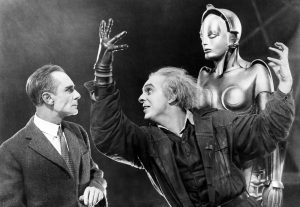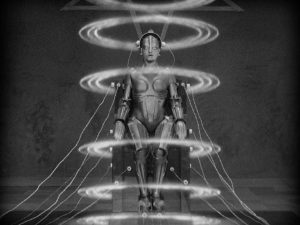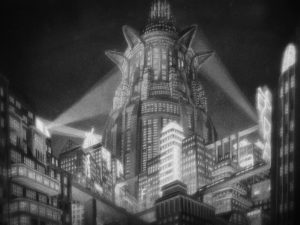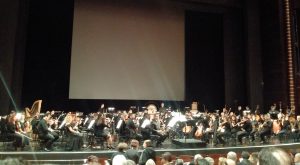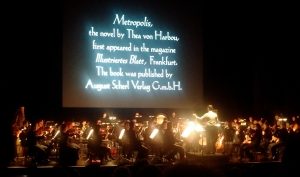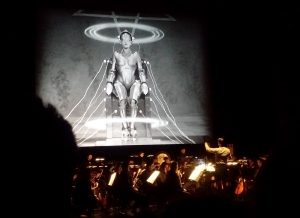Metropolis – Live in Concert – Athens 2017
On Sunday January 15th, a special concert was held in Athens where a restored version of the classic film Metropolis was screened, that included Gottfried Huppertz’s original soundtrack, played live for the occasion.
Nikiforos Chrysoloras, composer, orchestrator and arranger, was in the rehearsals and attended the premiere of the film with live music, and has prepared this summary of the event for SoundTrackFest where he tells us what was lived there.
Introduction
Metropolis: Berlin (Germany), January 10th, 1927 – Athens (Greece), January 15th, 2017.
90 years (and 5 days to be exact) passed from its world premiere at the UFA-Palast Am Zoo theatre in Berlin. Although, the fully restored version of the film was premiered in Greece, back in 2015, at the 56th edition of the Thessaloniki International Film Festival, it was not until January 15th 2017 when Athens’ cinephiles, and film music enthusiasts had the opportunity to watch, for the first time, Fritz Lang’s sci-fi masterpiece digitally restored to its original length. Accompanied by Gottfried Huppertz’s fully reconstructed orchestral score, performed live by the Athens State Orchestra and conducted by none other than the maestro of film music in Europe, Frank Strobel – also responsible for the score’s reconstruction – this was a night to remember.
The copy of the film was courtesy of the Friedrich-Wilhelm-Murnau Foundation (Murnau Stiftung) and the music, courtesy of the European FilmPhilharmonic Institute – also co-produced the concert in conjunction with the Embassy of Germany in Athens.
Before we go into more detail about the concert itself; a few words about the film’s restoration history and music reconstruction.
METROPOLIS: RETROSPECTIVE - RESTORATION ATTEMPTS AND DIRECTOR’S CUT
‘Why are you so interested in a picture which no longer exists?’ Fritz Lang’s response when asked by author Robert Bloch about Metropolis.
While the film received a standing ovation at its Berlin premiere – January 10 1927 -, film critics gave it mixed reviews. It was pulled from the theatres a few weeks later. The first German re-release – August 1927 – , was severely cut. For the US release, Paramount – along with Metro Goldwyn Pictures had signed a US distribution deal with UFA – ordered additional editing and re-writing of the intertitles, the result of which altered the film’s narrative. American playwright Channing Pollock was hired for the task. It is worth mentioning that Paramount and Metro Goldwyn Pictures founded the distribution company Parufamet, who loaned UFA large sums of money to continue financing films, one of them being Metropolis.
Paramount’s decision for altering the film’s length was based on the fact that the film did not meet Hollywood’s key selling points and the plot was too complex for American audiences to follow. Political reasons were also responsible for the film’s alteration; one of them being the film’s supposed underlined references to Communism. The new version – about an hour of footage was left in the editing floor – had its US release, in March, 1927. For the next 80 years, the missing footage remained lost.
As expected, the film’s score had to be adapted according to the new Paramount/UFA cut. Huppertz omitted a substantial amount of the score and replaced parts with ‘stock’ music by Frederick Chopin and Giuseppe Becce.
A number of attempts were made – in the following decades – to restore the film; most notable being a) the 1969 attempt with materials from the Bundesarchiv (former Staatliches Filmarchiv der DDR), b) Giorgio Moroder’s 1984 re-edited (with the use of still photographs), colourised version, with the soundtrack featuring songs by artists such as Freddie Mercury, Jon Anderson and Bonnie Tyler, among others, c) the 1987 restoration by German film historian, preservationist and former head of the Munich Film Museum Enno Patalas, and d) the 2002 Martin Koeber restoration in conjuction with the Bundesarchiv and the Murnau Stiftung.
Gottfried Huppertz‘s condensed score had an integral part in the 1986 restoration. The composer had written specific instructions for the musicians, lines from the original intertitles, in order to play in-sync with the film. Those instructions were used as a guide to determine the material missing from the various altered versions of the film.
It was not until 2008, when a copy of the original print, dated 1928, discovered at the Buenos Aires Museo Del Cine. The definitive restoration of Lang’s masterpiece (the director’s cut), supervised by Anke Wilkening of the Murnau Stiftung, was premiered in February 2010, at the Berlin Film Festival to critical acclaim.
METROPOLIS: LIVE IN CONCERT, ATHENS, 2017
A couple of days before the Athens premiere, I visited my dear friend Frank Strobel, during the morning rehearsal with the Athens State Orchestra, at the Athens Music Hall. It was the orchestra’s first day – back from Christmas break – and admittedly it was quite a demanding first day at work. Frank meticulously, went through every cue until it was perfect. When I walked in, they were rehearsing the Yoshiwara Foxtrot, a very important cue and iconic moment in the film. The orchestra’s solid performance during rehearsals was an indication of the magic that was about to happen.
On the night of the concert, the Alexandra Trianti Hall, with a 1750 seat capacity, was packed. An encouraging view I might add; people of all ages showing active interest in events of such cultural significance… considering.
Film started rolling with an introduction of what we were about to see, details about the discovery of the original print in 2008 and the restoration process.
What was surprising though, and I have to say a bit disappointing, was the lack of Greek translated subtitles. For those with a limited English proficiency, it was difficult to follow and understand the film’s plot.
A few moments later Frank Strobel’s downbeat set the wheels in motion.
Presented in its full glory, Metropolis – with context and a message more relevant than ever; after all it is set not too far away, in the year 2026 – was an eye opener. The film’s plot, vision, symbolism, visuals & special effects, set pieces and music, were the elements that deservedly characterize it as the most influential film of the silent era, a landmark in German Expressionism and the cornerstone of sci-fi cinema.
Gottfried Huppertz’s reconstructed score was no less than magnificent. Influenced by composers such as Richard Wagner and Richard Strauss, Huppertz uses the leitmotif as basis for the entire score. The themes were so well structured and clearly presented, that the audience could easily recall at any given moment a character or a setting, with their eyes closed. ‘Metropolis’, ‘Tower of Babel’, ‘Buro Fredersen’, ‘Moloch’, ‘Yoshiwara Foxtrot’ and the aggressive ostinato figures of the ‘Machines’, were but a few of the film’s main themes. In addition, quotations from works such as Rouget de Lisle’s ‘La Marseillaise’ and ‘Dies Irae’ were incorporated within the score and used in key moments.
Frank Strobel’s masterful conducting was undoubtedly the driving force behind the orchestra’s powerful performance.
It is worth mentioning (for the film music tech-savvy readers) that for the duration of the concert there was no use of click track, streamers or punches; yet, Frank’s conducting was so precise that it was like watching a film with a pre-recorded score.
The resulting standing ovation was only natural; the best way to conclude an amazing evening and an unforgettable experience.


